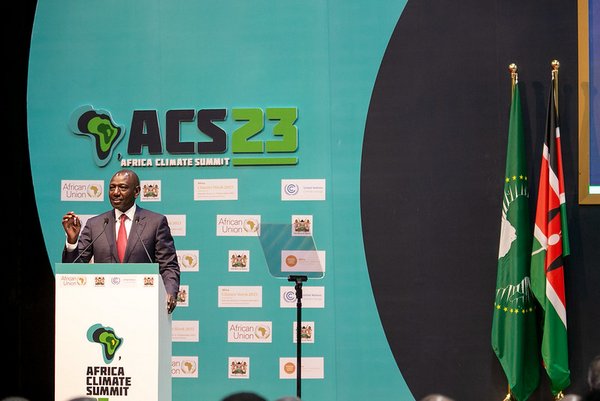 Read this article in French
Read this article in French- Share this article
- Subscribe to our newsletter
Africa Climate Summit
Three months ahead of the UN Climate Change Conference (COP 28), policy-makers, practitioners, business and civil society representatives met from 4th to 6th September 2013 at the Africa Climate Summit in Nairobi, Kenya, under the theme “Driving Green Growth and Climate Finance Solutions for Africa and the World”.
“Mitigating climate change can become one of the key drivers of growth in Africa,” said European Commission President Ursula von der Leyen. “Africa requires massive investments for this. And Europe seeks to become the partner closing this gap. That is why half of the finance we are making available in our 300 billion euro “Global Gateway” investment plan is earmarked for the African continent.”
At the summit, the United Arab Emirates (UAE), hosting COP 28 in November, announced a 4.5 billion USD Finance Initiative to Unlock Africa's Clean Energy Potential. The initiative brings together public, private and development capital from UAE institutions. Africa50, which is an investment platform established by African governments and the Africa Development Bank (AfDB), has also joined the UAE Finance Initiative. Africa50 was founded to help solve the continent's critical infrastructure challenges and will assist in identifying initial projects and connecting to local implementing entities.
The commitments and announcements at the Africa Climate Summit equate to a combined investment of nearly 26 billion USD from public, private sector, and multilateral development banks, philanthropic foundations, and other partners in the development financing community.
Nairobi Declaration on Climate Change
At the summit, African leaders endorsed The African Leaders Nairobi Declaration on Climate Change, calling for collective global action in resource mobilisation for both development and climate action. Here, they referred to the commitments made at the Paris Summit for a New Global Financing Pact last June. According to the Pact, no country should have to choose between fighting poverty and fighting for the planet.
Led by Kenyan President William Ruto and AU Commission Chairperson Moussa Faki, African leaders urged development partners to align their technical and financial resources towards promoting sustainable utilisation of the continent’s natural assets. They appealed to world leaders to consider the proposal for a global carbon taxation regime and called for affordable and accessible finance for climate-positive investments.
Reforms in the multilateral financial architecture and the mobilisation of adequate financial resources were vital to the continent’s well-being and the success of climate action, President Ruto said.
Harnessing Africa’s renewable energy potential
At the session Harnessing Africa’s renewable energy potential, African Development Bank President Akinwumi Adesina underlined Africa’s tremendous potential in energy—from hydro and wind power, and solar to geothermal—which remained untapped, in the face of a staggering electricity deficit on the continent. Africa had an almost unlimited potential of solar capacity (11 TW), abundant hydro (350 GW), out of which only 5-6 per cent was being harvested, wind (110 GW), of which a mere two per cent was being used, and geothermal energy sources (15 GW), Adesina said.
He called for investments in renewable energy in Africa, pointing out the continent’s rich energy mix, emphasising: “Every economy can only go as far as the energy it produces.”
Accelerated Partnership for Renewables in Africa
The International Renewable Energy Agency (IRENA), in collaboration with Kenya, Denmark, Germany, and the United Arab Emirates founded a new partnership, pledging to boost renewable energy in Africa. The Accelerated Partnership for Renewables in Africa (APRA) was launched by President Ruto, who is also head of the Committee of African Heads of State and Government on Climate Change (CAHOSCC) at the Africa Climate Summit. At the launch event, Ruto outlined Kenya’s ambition to achieve 100 per cent renewable power by 2030 and to fuel the green industries of the future by 2040.
In addition to Kenya, APRA includes Ethiopia, Namibia, Rwanda, Sierra Leone and Zimbabwe. The partnership focuses on three key areas: mobilising finance, providing technical assistance and capacity building, and engaging the private sector. Partners are inviting other countries as well as public and private sector organisations to join APRA to amplify efforts, lead ambitious climate action and implement effective green energy strategies.
A common vision for drought resilience
Acknowledging that severe drought affects Africa more than any other continent, leaders at the Africa Climate Summit in Nairobi have put forward a common vision for drought resilience in the run up to the next climate and desertification summits — UNFCCC COP28 in November 2023 and UNCCD COP16 in December 2024. The objective is to reduce the costs of future droughts for societies and economies through strategic investments in sustainable land and water management.
Speaking at the high-level side event Empowering Africa’s Drought Resilience, convened by the International Drought Resilience Alliance (IDRA), H.E. Alioune Ndoye, Minister for Environment of Senegal, said: “Driving an African agenda for drought resilience is one of our priorities as co-chair of IDRA. We have experienced the devastating impacts of drought on lives and livelihoods and are committed to pioneering solutions for people and for the climate, land and biodiversity that sustains us all.”
During the African Climate Summit, Comoros and the Climate Commission for the Sahel Region (CCSR) announced their adhesion to IDRA.
Ines Lechner, editor, Rural 21
More information:
- Website of the Africa Climate Summit
- Overview on outcomes and commitments of the Africa Climate Summit
- Website on Kenyan Government
- Paris Summit for a New Global Financing Pact
- Accelerated Partnership for Renewables in Africa
- A common vision for drought resilience
- Harnessing Africa’s renewable energy potential





Add a comment
Comments :